Business Law Report: UK Company, Contract, and Employment Law
VerifiedAdded on 2023/02/02
|16
|1341
|22
Report
AI Summary
This report delves into key aspects of UK business law, providing a comprehensive overview of company law, contract law, and employment law. It begins by outlining the relevant legislation, such as the Companies Act 2006, The Contracts (Applicable Law) Act 1990, and various employment laws including the Employment Rights Act 1996 and the Insolvency Act 1986. The report then presents three case studies, each illustrating legal issues and potential solutions within these areas. Case 1 examines an employment contract dispute, Case 2 analyzes a breach of contract for services, and Case 3 addresses a company facing potential winding up. Each case includes a discussion of the applicable legal principles and justifications. The report concludes by comparing and contrasting the effectiveness of the recommended legal solutions and critically evaluating the use of appropriate legal solutions in comparison with alternative dispute resolution (ADR) methods. References from legal journals and textbooks are included to support the analysis.

BUSINESS LAW
Paraphrase This Document
Need a fresh take? Get an instant paraphrase of this document with our AI Paraphraser
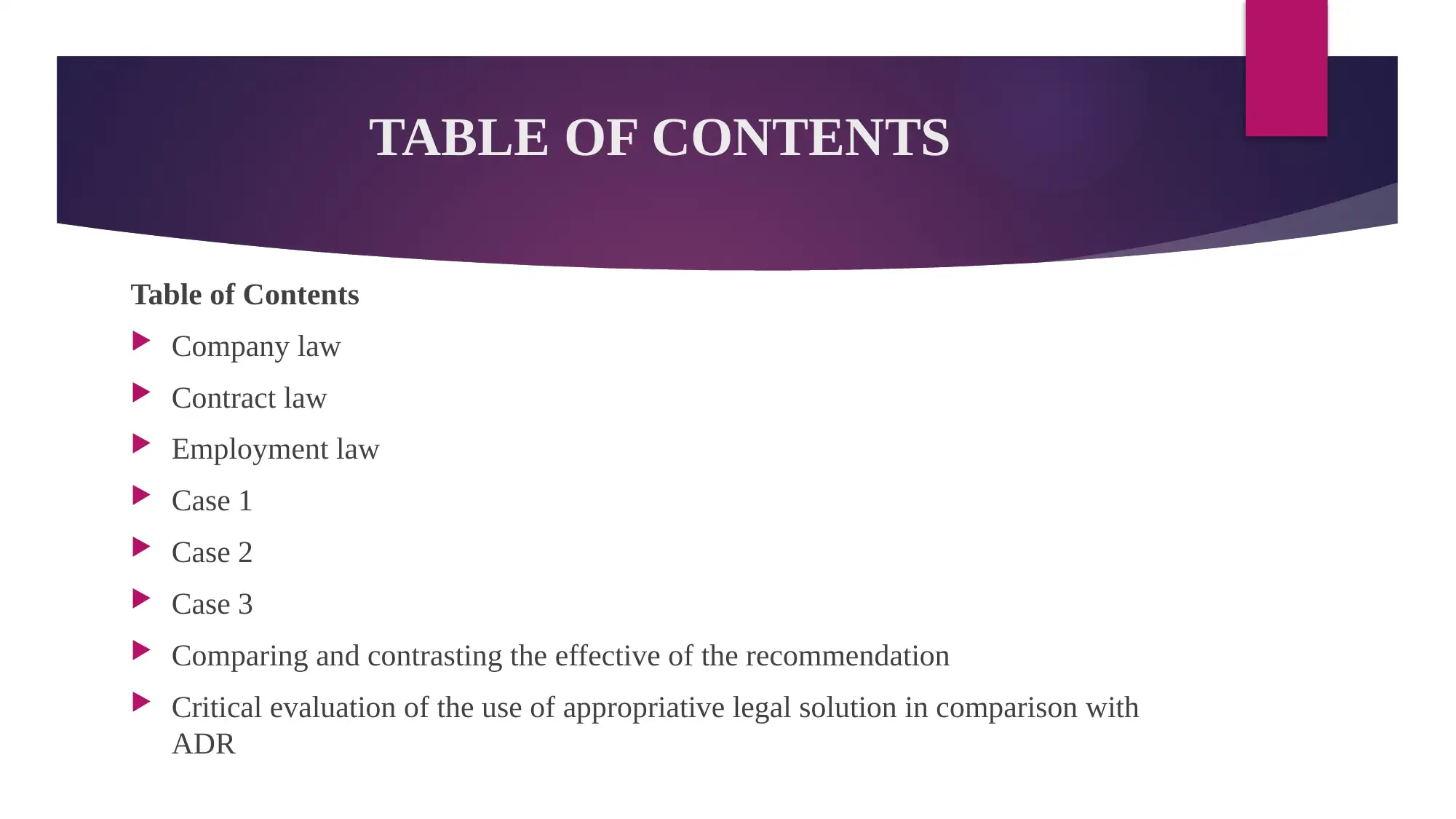
TABLE OF CONTENTS
Table of Contents
Company law
Contract law
Employment law
Case 1
Case 2
Case 3
Comparing and contrasting the effective of the recommendation
Critical evaluation of the use of appropriative legal solution in comparison with
ADR
Table of Contents
Company law
Contract law
Employment law
Case 1
Case 2
Case 3
Comparing and contrasting the effective of the recommendation
Critical evaluation of the use of appropriative legal solution in comparison with
ADR
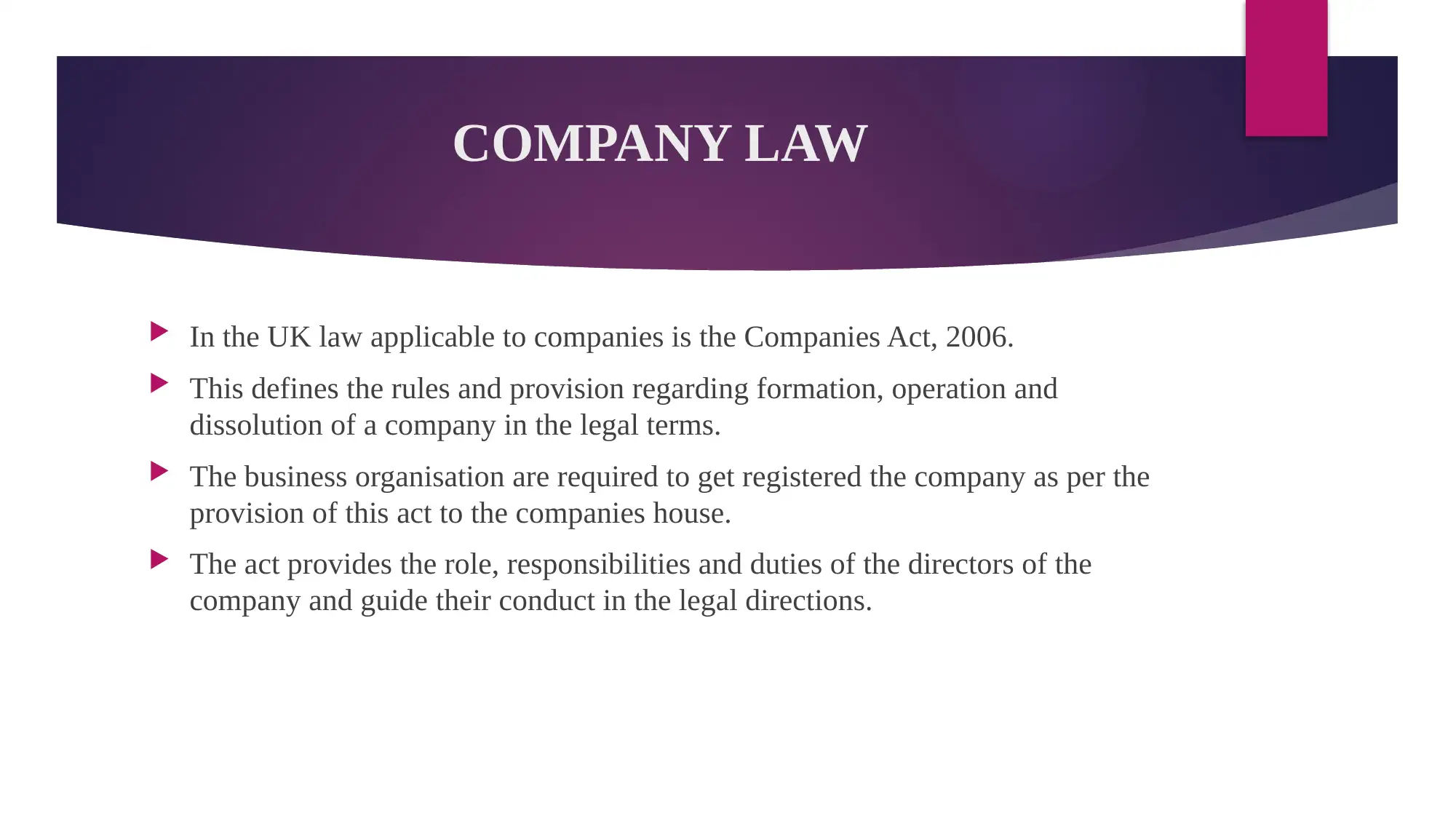
COMPANY LAW
In the UK law applicable to companies is the Companies Act, 2006.
This defines the rules and provision regarding formation, operation and
dissolution of a company in the legal terms.
The business organisation are required to get registered the company as per the
provision of this act to the companies house.
The act provides the role, responsibilities and duties of the directors of the
company and guide their conduct in the legal directions.
In the UK law applicable to companies is the Companies Act, 2006.
This defines the rules and provision regarding formation, operation and
dissolution of a company in the legal terms.
The business organisation are required to get registered the company as per the
provision of this act to the companies house.
The act provides the role, responsibilities and duties of the directors of the
company and guide their conduct in the legal directions.
⊘ This is a preview!⊘
Do you want full access?
Subscribe today to unlock all pages.

Trusted by 1+ million students worldwide
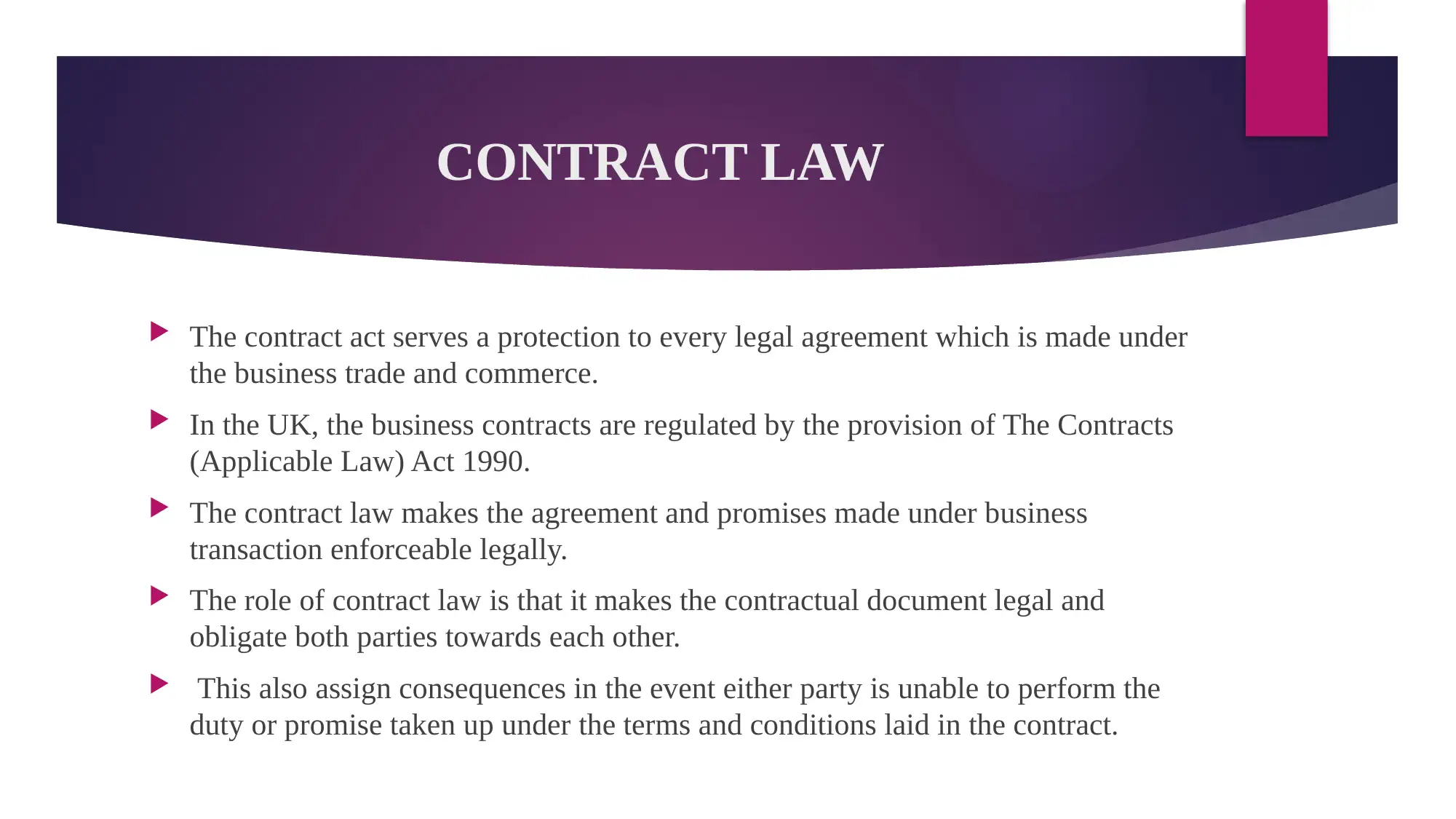
CONTRACT LAW
The contract act serves a protection to every legal agreement which is made under
the business trade and commerce.
In the UK, the business contracts are regulated by the provision of The Contracts
(Applicable Law) Act 1990.
The contract law makes the agreement and promises made under business
transaction enforceable legally.
The role of contract law is that it makes the contractual document legal and
obligate both parties towards each other.
This also assign consequences in the event either party is unable to perform the
duty or promise taken up under the terms and conditions laid in the contract.
The contract act serves a protection to every legal agreement which is made under
the business trade and commerce.
In the UK, the business contracts are regulated by the provision of The Contracts
(Applicable Law) Act 1990.
The contract law makes the agreement and promises made under business
transaction enforceable legally.
The role of contract law is that it makes the contractual document legal and
obligate both parties towards each other.
This also assign consequences in the event either party is unable to perform the
duty or promise taken up under the terms and conditions laid in the contract.
Paraphrase This Document
Need a fresh take? Get an instant paraphrase of this document with our AI Paraphraser
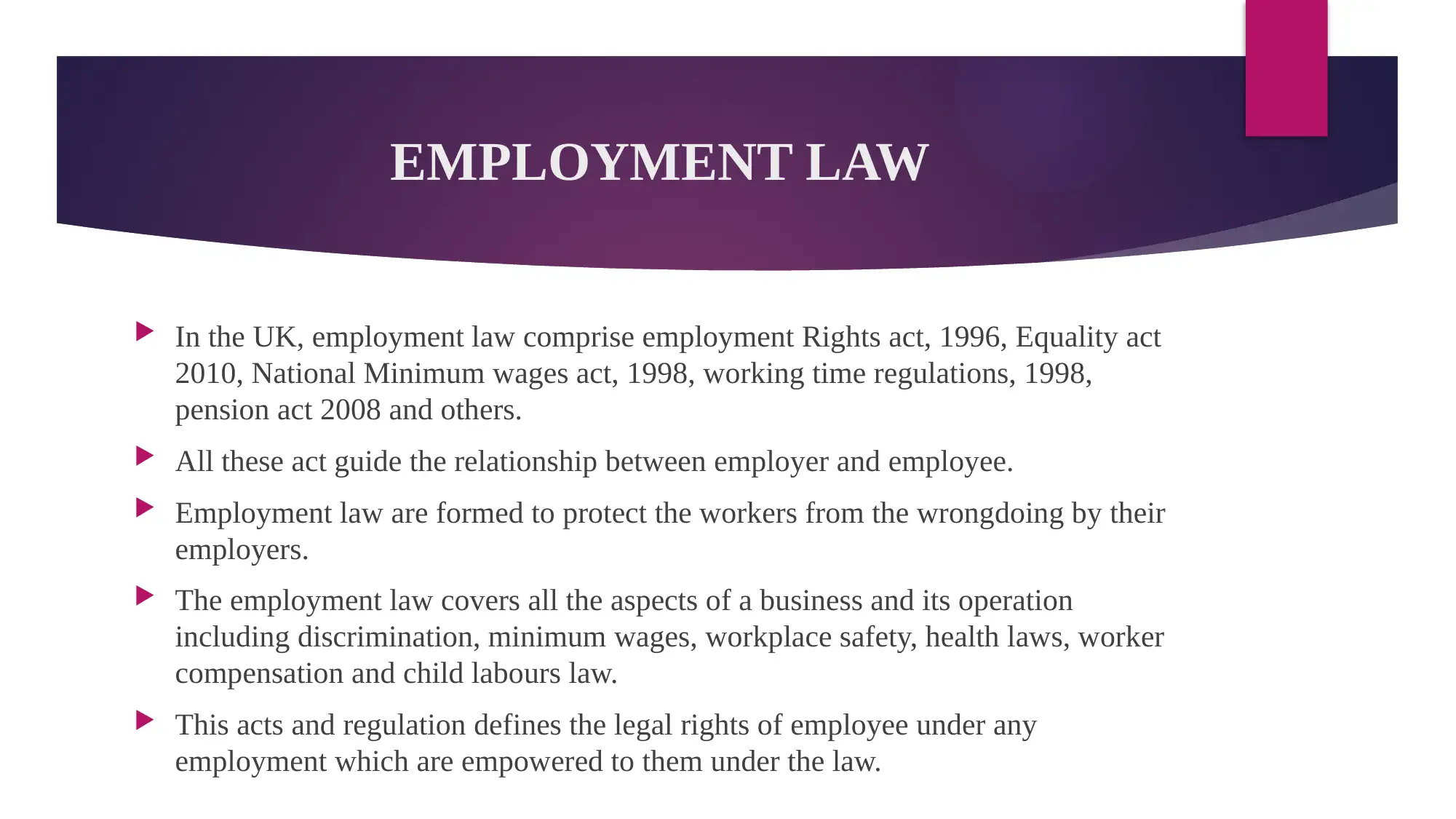
EMPLOYMENT LAW
In the UK, employment law comprise employment Rights act, 1996, Equality act
2010, National Minimum wages act, 1998, working time regulations, 1998,
pension act 2008 and others.
All these act guide the relationship between employer and employee.
Employment law are formed to protect the workers from the wrongdoing by their
employers.
The employment law covers all the aspects of a business and its operation
including discrimination, minimum wages, workplace safety, health laws, worker
compensation and child labours law.
This acts and regulation defines the legal rights of employee under any
employment which are empowered to them under the law.
In the UK, employment law comprise employment Rights act, 1996, Equality act
2010, National Minimum wages act, 1998, working time regulations, 1998,
pension act 2008 and others.
All these act guide the relationship between employer and employee.
Employment law are formed to protect the workers from the wrongdoing by their
employers.
The employment law covers all the aspects of a business and its operation
including discrimination, minimum wages, workplace safety, health laws, worker
compensation and child labours law.
This acts and regulation defines the legal rights of employee under any
employment which are empowered to them under the law.
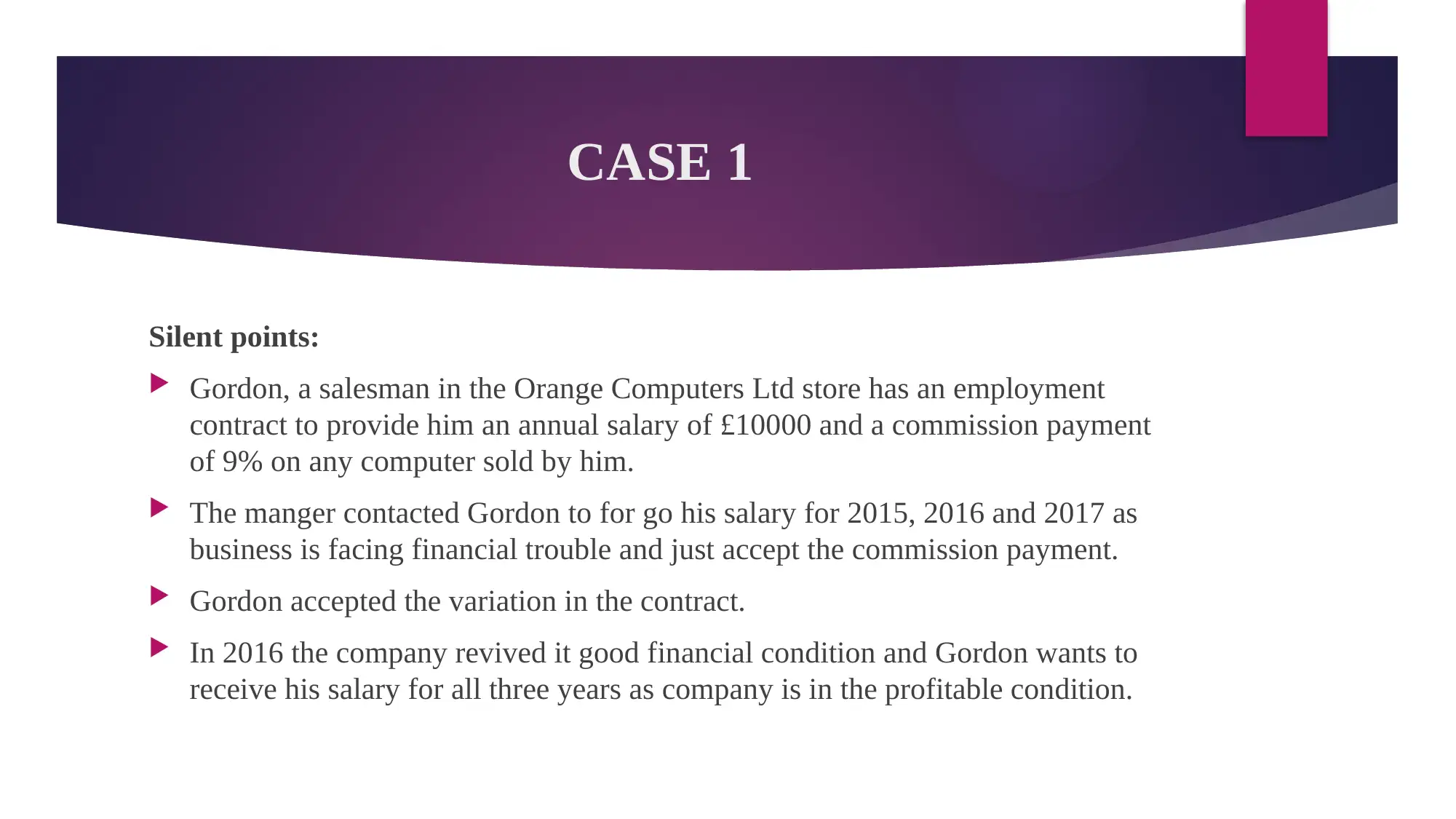
CASE 1
Silent points:
Gordon, a salesman in the Orange Computers Ltd store has an employment
contract to provide him an annual salary of £10000 and a commission payment
of 9% on any computer sold by him.
The manger contacted Gordon to for go his salary for 2015, 2016 and 2017 as
business is facing financial trouble and just accept the commission payment.
Gordon accepted the variation in the contract.
In 2016 the company revived it good financial condition and Gordon wants to
receive his salary for all three years as company is in the profitable condition.
Silent points:
Gordon, a salesman in the Orange Computers Ltd store has an employment
contract to provide him an annual salary of £10000 and a commission payment
of 9% on any computer sold by him.
The manger contacted Gordon to for go his salary for 2015, 2016 and 2017 as
business is facing financial trouble and just accept the commission payment.
Gordon accepted the variation in the contract.
In 2016 the company revived it good financial condition and Gordon wants to
receive his salary for all three years as company is in the profitable condition.
⊘ This is a preview!⊘
Do you want full access?
Subscribe today to unlock all pages.

Trusted by 1+ million students worldwide
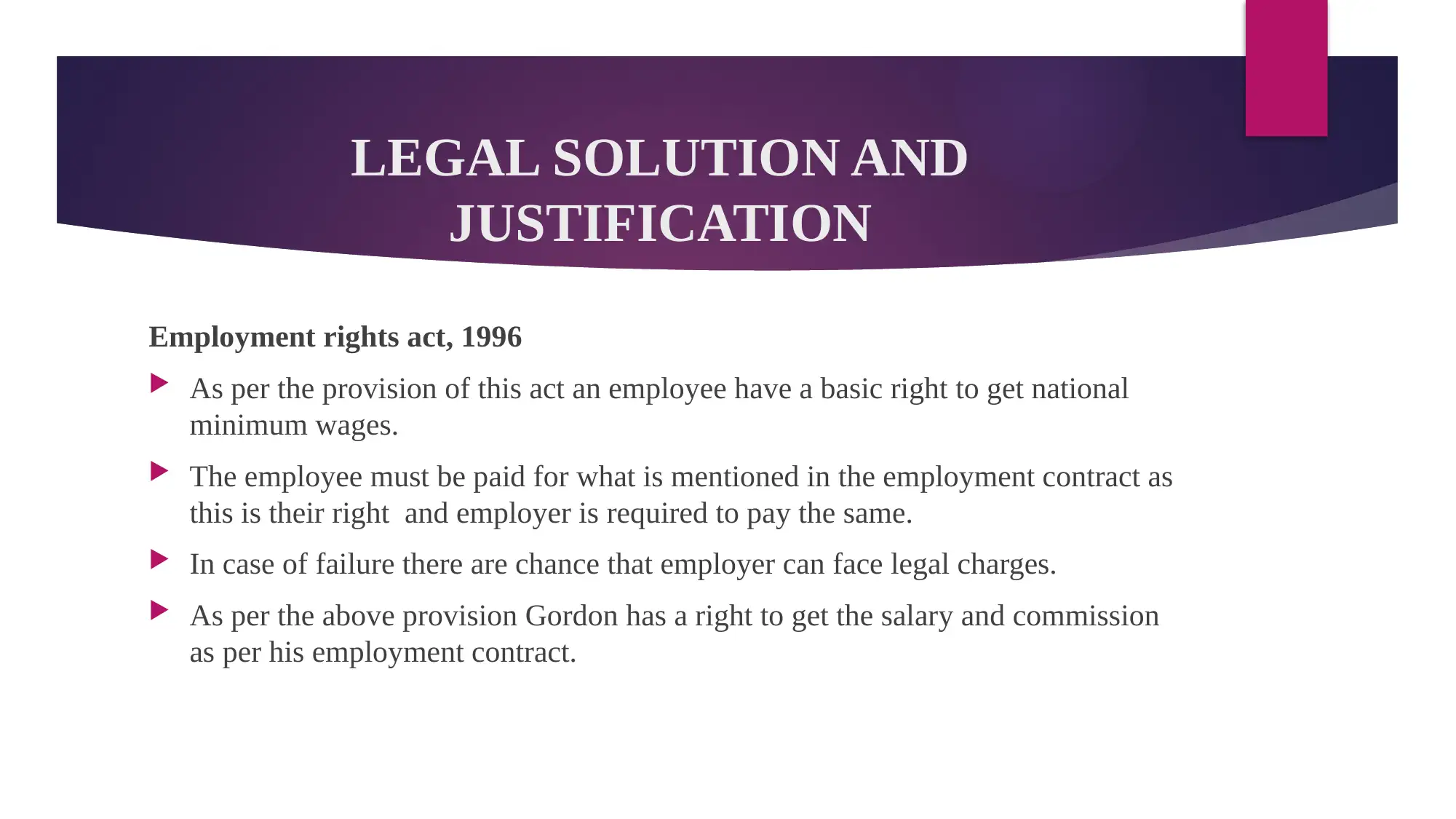
LEGAL SOLUTION AND
JUSTIFICATION
Employment rights act, 1996
As per the provision of this act an employee have a basic right to get national
minimum wages.
The employee must be paid for what is mentioned in the employment contract as
this is their right and employer is required to pay the same.
In case of failure there are chance that employer can face legal charges.
As per the above provision Gordon has a right to get the salary and commission
as per his employment contract.
JUSTIFICATION
Employment rights act, 1996
As per the provision of this act an employee have a basic right to get national
minimum wages.
The employee must be paid for what is mentioned in the employment contract as
this is their right and employer is required to pay the same.
In case of failure there are chance that employer can face legal charges.
As per the above provision Gordon has a right to get the salary and commission
as per his employment contract.
Paraphrase This Document
Need a fresh take? Get an instant paraphrase of this document with our AI Paraphraser
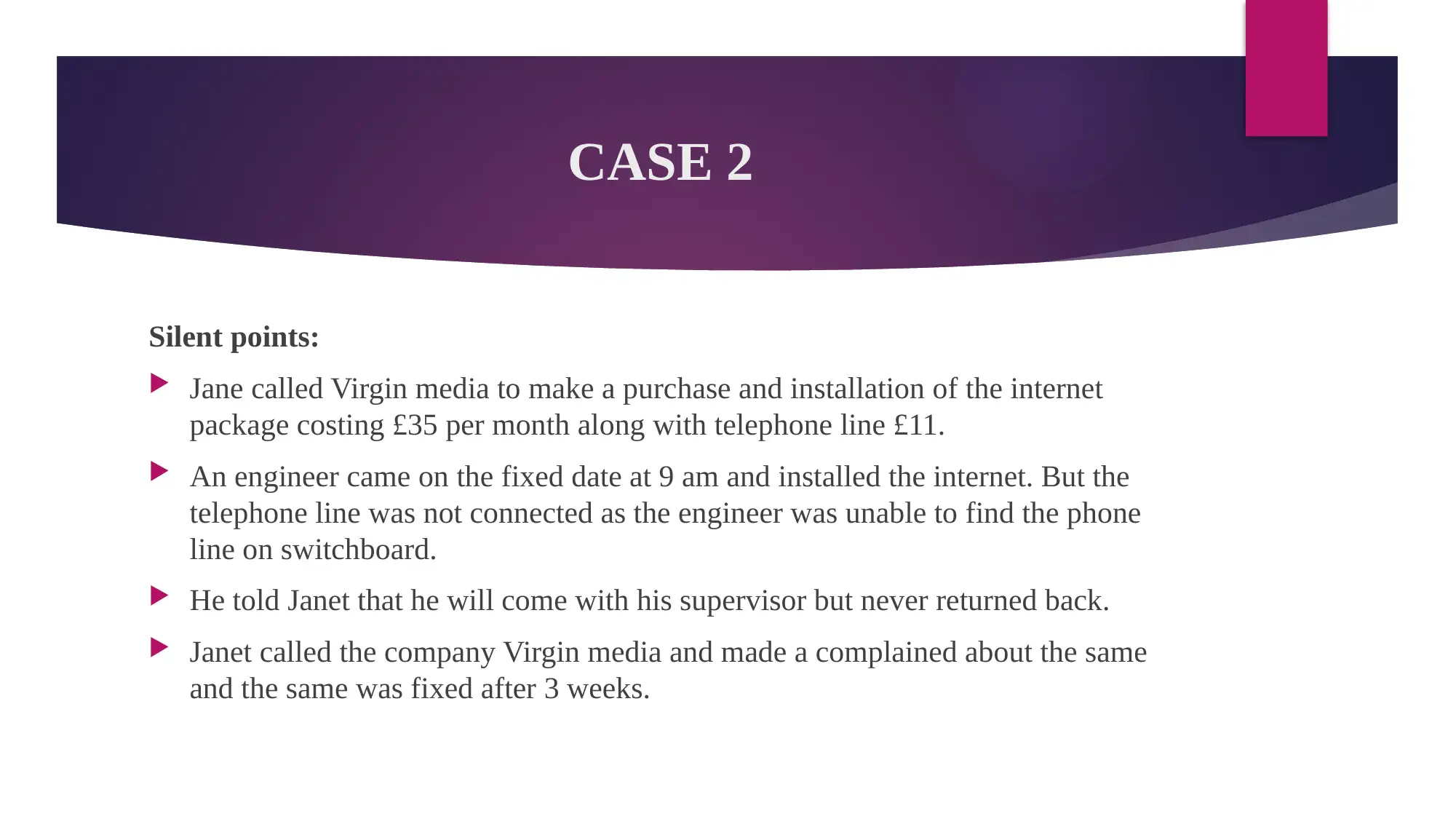
Silent points:
Jane called Virgin media to make a purchase and installation of the internet
package costing £35 per month along with telephone line £11.
An engineer came on the fixed date at 9 am and installed the internet. But the
telephone line was not connected as the engineer was unable to find the phone
line on switchboard.
He told Janet that he will come with his supervisor but never returned back.
Janet called the company Virgin media and made a complained about the same
and the same was fixed after 3 weeks.
CASE 2
Jane called Virgin media to make a purchase and installation of the internet
package costing £35 per month along with telephone line £11.
An engineer came on the fixed date at 9 am and installed the internet. But the
telephone line was not connected as the engineer was unable to find the phone
line on switchboard.
He told Janet that he will come with his supervisor but never returned back.
Janet called the company Virgin media and made a complained about the same
and the same was fixed after 3 weeks.
CASE 2
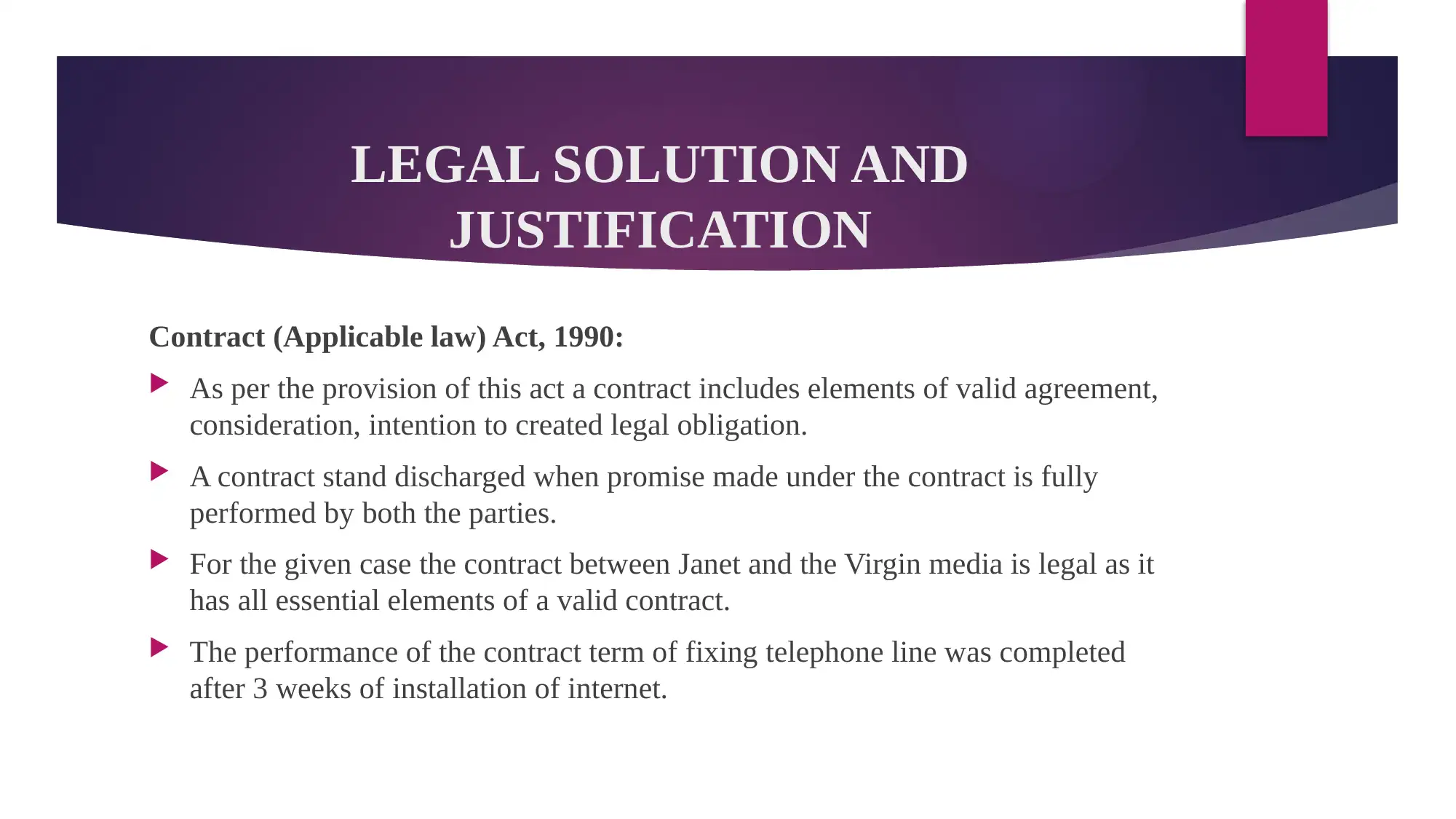
LEGAL SOLUTION AND
JUSTIFICATION
Contract (Applicable law) Act, 1990:
As per the provision of this act a contract includes elements of valid agreement,
consideration, intention to created legal obligation.
A contract stand discharged when promise made under the contract is fully
performed by both the parties.
For the given case the contract between Janet and the Virgin media is legal as it
has all essential elements of a valid contract.
The performance of the contract term of fixing telephone line was completed
after 3 weeks of installation of internet.
JUSTIFICATION
Contract (Applicable law) Act, 1990:
As per the provision of this act a contract includes elements of valid agreement,
consideration, intention to created legal obligation.
A contract stand discharged when promise made under the contract is fully
performed by both the parties.
For the given case the contract between Janet and the Virgin media is legal as it
has all essential elements of a valid contract.
The performance of the contract term of fixing telephone line was completed
after 3 weeks of installation of internet.
⊘ This is a preview!⊘
Do you want full access?
Subscribe today to unlock all pages.

Trusted by 1+ million students worldwide
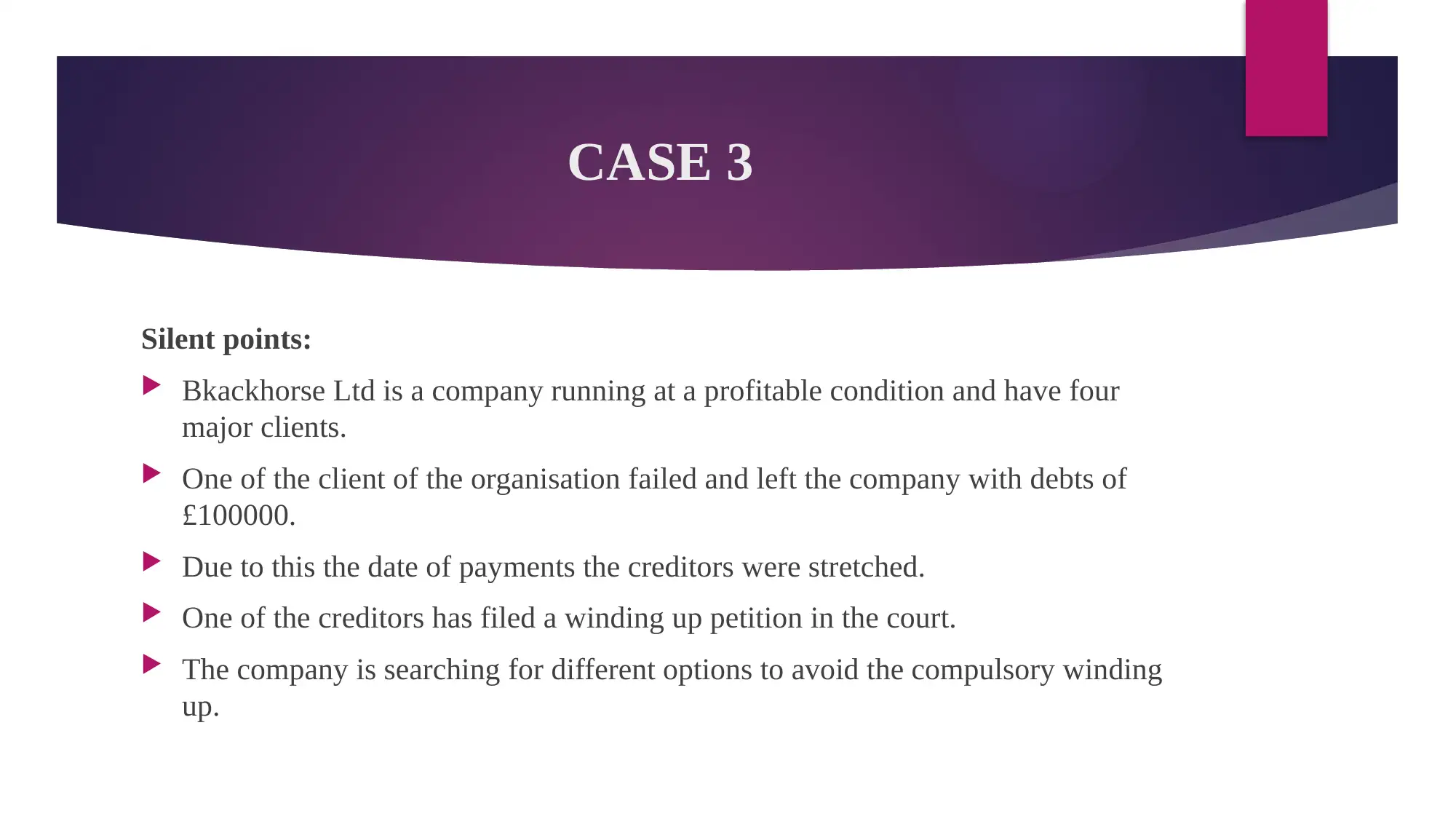
CASE 3
Silent points:
Bkackhorse Ltd is a company running at a profitable condition and have four
major clients.
One of the client of the organisation failed and left the company with debts of
£100000.
Due to this the date of payments the creditors were stretched.
One of the creditors has filed a winding up petition in the court.
The company is searching for different options to avoid the compulsory winding
up.
Silent points:
Bkackhorse Ltd is a company running at a profitable condition and have four
major clients.
One of the client of the organisation failed and left the company with debts of
£100000.
Due to this the date of payments the creditors were stretched.
One of the creditors has filed a winding up petition in the court.
The company is searching for different options to avoid the compulsory winding
up.
Paraphrase This Document
Need a fresh take? Get an instant paraphrase of this document with our AI Paraphraser
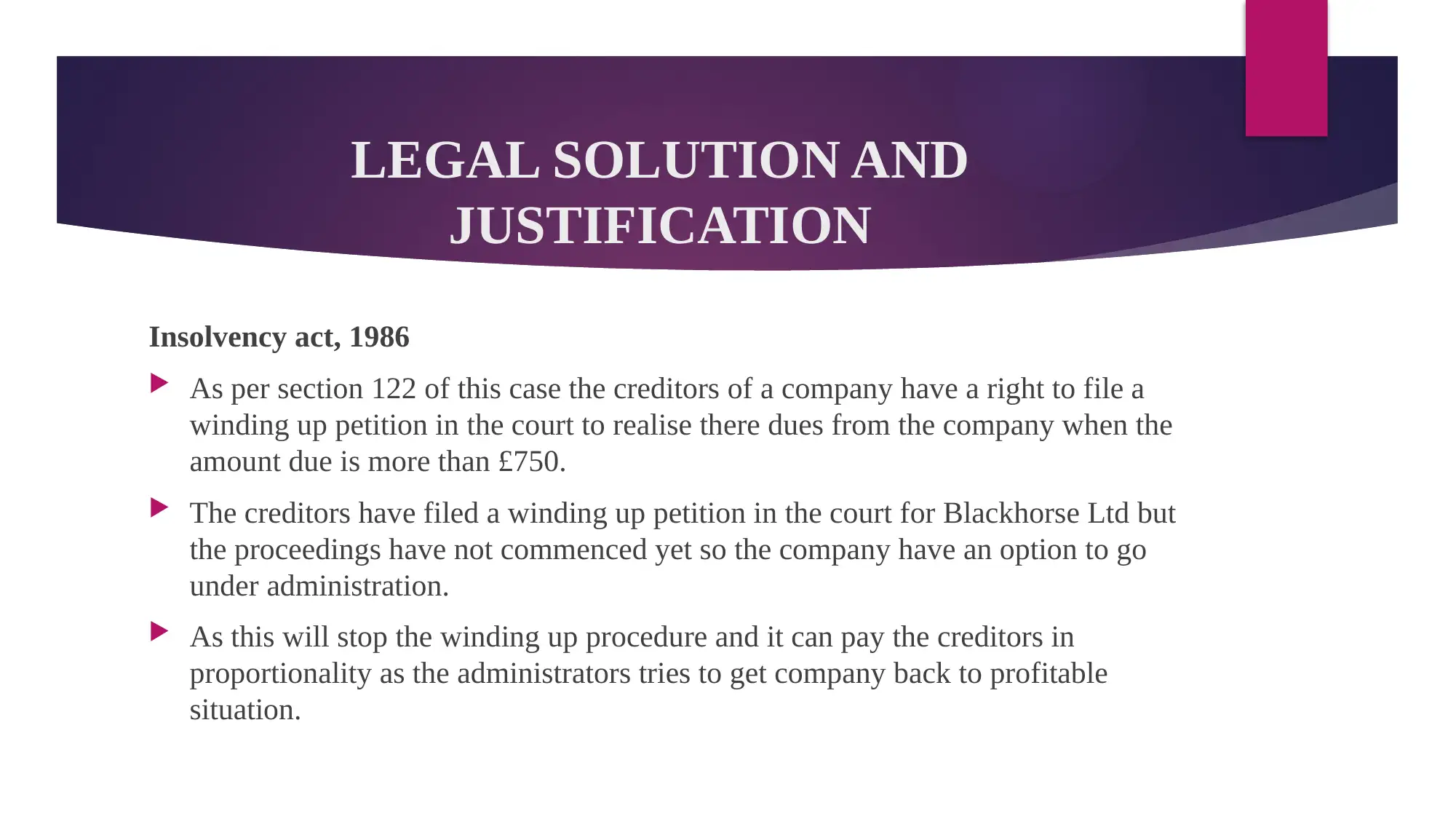
LEGAL SOLUTION AND
JUSTIFICATION
Insolvency act, 1986
As per section 122 of this case the creditors of a company have a right to file a
winding up petition in the court to realise there dues from the company when the
amount due is more than £750.
The creditors have filed a winding up petition in the court for Blackhorse Ltd but
the proceedings have not commenced yet so the company have an option to go
under administration.
As this will stop the winding up procedure and it can pay the creditors in
proportionality as the administrators tries to get company back to profitable
situation.
JUSTIFICATION
Insolvency act, 1986
As per section 122 of this case the creditors of a company have a right to file a
winding up petition in the court to realise there dues from the company when the
amount due is more than £750.
The creditors have filed a winding up petition in the court for Blackhorse Ltd but
the proceedings have not commenced yet so the company have an option to go
under administration.
As this will stop the winding up procedure and it can pay the creditors in
proportionality as the administrators tries to get company back to profitable
situation.
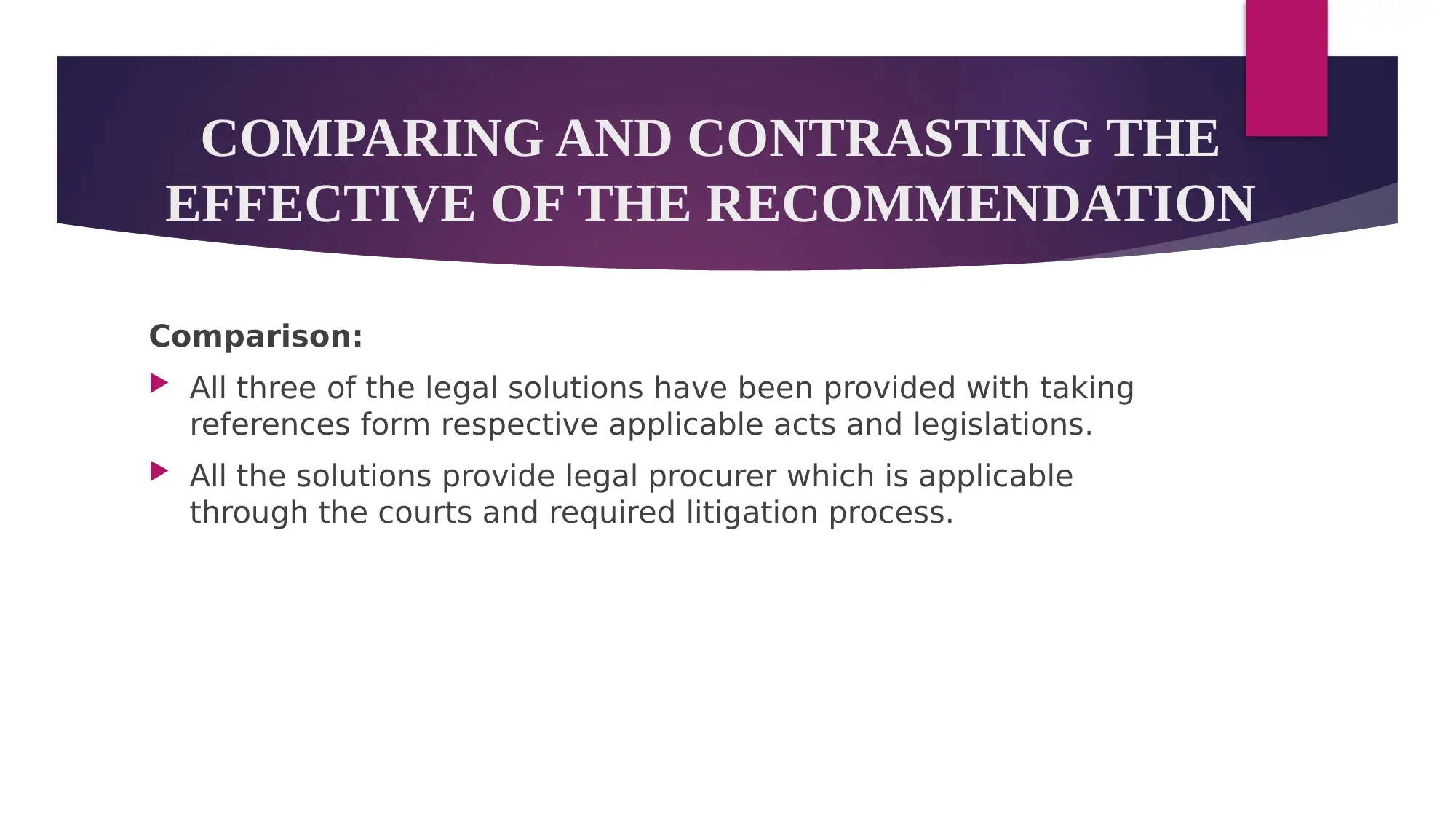
COMPARING AND CONTRASTING THE
EFFECTIVE OF THE RECOMMENDATION
Comparison:
All three of the legal solutions have been provided with taking
references form respective applicable acts and legislations.
All the solutions provide legal procurer which is applicable
through the courts and required litigation process.
EFFECTIVE OF THE RECOMMENDATION
Comparison:
All three of the legal solutions have been provided with taking
references form respective applicable acts and legislations.
All the solutions provide legal procurer which is applicable
through the courts and required litigation process.
⊘ This is a preview!⊘
Do you want full access?
Subscribe today to unlock all pages.

Trusted by 1+ million students worldwide
1 out of 16
Related Documents
Your All-in-One AI-Powered Toolkit for Academic Success.
+13062052269
info@desklib.com
Available 24*7 on WhatsApp / Email
![[object Object]](/_next/static/media/star-bottom.7253800d.svg)
Unlock your academic potential
Copyright © 2020–2026 A2Z Services. All Rights Reserved. Developed and managed by ZUCOL.




